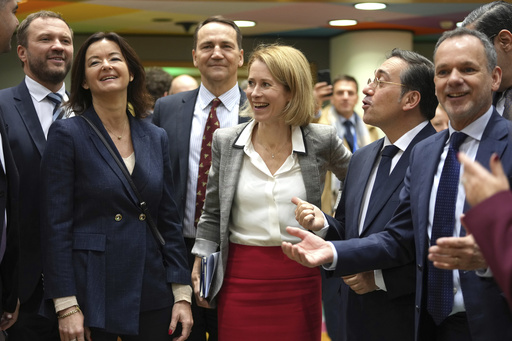BRUSSELS — On Monday, the European Union announced plans to implement visa restrictions on Georgian diplomats and government officials following a violent police response to opposition protests that have emerged in the wake of October’s disputed elections. The protests, which have seen tens of thousands of participants, were sparked by the ruling party’s abrupt halt of discussions related to EU membership. Police forces have increasingly resorted to aggressive measures to disperse demonstrators during these gatherings.
Mikheil Kavelashvili, a former soccer star, took office as the president of Georgia on Saturday, further consolidating power for the ruling Georgian Dream party amid accusations from the opposition that the elections were manipulated with the involvement of Moscow.
EU foreign policy chief Kaja Kallas, after conducting what she referred to as a “very tense discussion” with the bloc’s foreign ministers, announced that they agreed to suspend the visa-free travel arrangements for diplomatic and service passport holders from Georgia. The European Commission has been assigned the responsibility to craft this new measure.
Additionally, Kallas presented a list of Georgian officials who may face sanctions; however, this proposal faced resistance from Hungary and Slovakia, which are viewed as the EU countries most aligned with Russia among the 27 member states. Kallas noted, “To impose sanctions, unanimous agreement among the 27 is essential,” but emphasized that the initiation of visa restrictions is a significant preliminary action.
During her initial meeting since taking office on December 1, Kallas remarked, “This is my first experience with a Hungarian veto, but it certainly won’t be the last.” Hungary is currently overseeing the EU’s rotating presidency, set to transfer to Poland at the end of the month. Over the past year, Hungary has frequently obstructed collective efforts to address actions against Russia or to support Ukraine, complicating collaborative efforts within the EU.
Lithuanian Foreign Minister K?stutis Budrys expressed that the visa ban represents the “minimum” necessary response to the situation, insisting, “We must communicate to the Georgian populace that Europe stands by you.” The EU granted Georgia candidate status for membership in December 2023; however, following the controversial enactment of a “foreign influence” law perceived as detrimental to democratic freedoms, the accession process has been stalled along with a reduction in financial support initiated in June.



